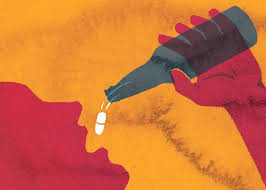All that remained from the previous night out was a throbbing headache, drowsiness and nausea. Jim lay face down in a vast pool of his own vomit, disoriented, bewildered and wallowing in his own filth. He was suffering a serious hangover from an entire night of binge drinking. But now in solitude, the emptiness of his own life hit hard. Jim was once one of the brightest prospects in his childhood, the kind of child any parent wouldn’t hesitate showing off. A straight A student, star athlete with a charismatic personality it seemed like he had it all together. But that was the past, now at twenty-two he is a wasted alcoholic and drug addict reduced to a shell of his former self. Depressed, intoxicated, Jim lay in reminiscence of his past glory, questioning where he had gone wrong. What had started off as an innocent search for pleasure and adventure had drastically spiraled into a series of self-destructive behavior. It made him drink his way out of a scholarship, distanced him from his family and now pushing him to near suicide.

Jim’s story is not a unique one, in fact the younger generation is more susceptible to alcoholism now more than ever with the highest prevalence among young adults aged (21-24) years (2018 World Health Organization report). Much as not all cases develop into extreme levels like suicide, it negatively impacts most young people’s lives. From a declining physical and mental health, to academic failure, financial instability to mention but a few. That’s even without mentioning the fact that global alcohol consumption-related mortality (5.3%) is higher than that related to tuberculosis (2.3%), HIV/AIDS (1.8%), diabetes (2.8%) and hypertension (1.6%). In spite of all the adverse effects of alcohol, it still remains the number one sought out form of pleasure among the youth. Studies from Wayne University show that there are two motivations of drinking. The first is for social reasons like parties and social interactions. Such motivation is less harmful and a bit more disciplined. The other more dangerous motivation for drinking alcohol is to suppress stress and anxiety and that is one of the main causes of alcoholism among young adults. What then are the main causes of anxiety and stress among young adults?
Social pressures: Young adulthood is a transitional stage which comes with a great deal of responsibility and independence. From financial independence to intimate relationships, the dynamics of maturity at this stage can cause extreme stress and anxiety to a person barely out of puberty. This causes them to develop unrealistic expectations from themselves in addition to the expectations that society sets upon them. They think by university they should have set up that business or at least gotten a well-paying side job, a stylish car and generally achieved financial independence. But along the road they slowly realize that things don’t always play by their rules. It’s even worsened by social media where other people post how better off their lives are than their own.
Peer pressure: Most youth don’t necessarily grow up with the taste for alcohol but are rather influenced by their peers. In a fear of rejection or worse, being ostracized, youth go to great lengths to conform to the habits of their peers even at the expense of their own values. They crave validation, fitting in is everything even if it means compromising their own deeper interests. It’s proof that they are loved or have a sense of belonging. That’s why most of them adopt standards they don’t even know who set. It’s why most of them would rather choose self-destructive behavior rather than risk being left out. “they would rather lose themselves than risk losing other people”.

Drive to achieve: A report by the Higher Education Research Institute, University of California linked an increase of stress and anxiety of college and university students to drive to achievement. This inverse correlation is reinforced by a general ambition mindset that society sets upon young people, an individualistic mindset that depends on how much one stands out. In a society that condones undisciplined ambition, even at the expense of physical and emotional health because that has become synonymous with maturity, at least that is what is portrayed. Working long hours and sleeping for only three becomes okay as long as it’s what will get a person that scholarship. Although this can be justified by the intense competition in the academic and working world. The competitiveness makes life feel like a chore and the only moments of serenity are those Friday nights that they are intoxicated.
Mental illness: In some cases, underlying mental health illnesses also play a vital role in contributing to alcoholism. Problem is most people have a misconception that mental health degeneration only takes place when one loses their sanity hence don’t pay much attention to the subtler mental health cases like depression, schizophrenia or bipolar disorder. Such illnesses root from younger adolescent ages but since they are not given the necessary attention end up sipping into the young adult ages. They are then elevated by the stress and anxiety of this stage of life. That is why young adulthood is the stage most susceptible to mental health issues, with anxiety disorder the most common at 11.9% among college students. Most youth suffer these illnesses silently and turn to numbing sensations like alcohol and drugs to self-medicate and numb their senses. This is also reinforced by society stigmas associated with mental health which makes youth fear seeking for help
Those are but a few causes of stress and anxiety among young adults which in turn results into a prevalence of alcoholism.
The inability of people to address such issues directly but rather turning to alcohol as a shortcut is dangerous. Much as alcohol is a short term fix which provides a numbing sensation, such problems end up manifesting in other even worse ways like violence or worse, suicide. Hence more attention ought to be paid to the mental health of especially young adults.

